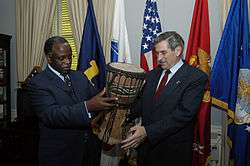Foreign relations of Uganda
 |
| This article is part of a series on the politics and government of Uganda |
|
Judiciary |
|
| Foreign relations |
|
Politics portal |
Bilateral relations
Democratic Republic of the Congo
On 19 December 2005, the International Court of Justice found against Uganda, in a case brought by the Democratic Republic of the Congo, for illegal invasion of its territory, and violation of human rights.
A rebel group operating in western Uganda and eastern Democratic Republic of the Congo, near the Rwenzori Mountains, the Allied Democratic Forces, emerged as a localized threat in 1996 and inflicted substantial suffering on the population in the area. It has largely been defeated by the UPDF and the areas secured.
Denmark
India
Israel
Ugandas relations with Israel remain uneasily strained due to the 1976 capturing of a French airliner hijacked by the Palestinian Liberation Organization in an airport in the now-famous city.
Kenya
From 1961 to 1965 the two states, along with Tanzania, were united in the East African Common Services Organization, a common market with a loose federal structure.[3]
Libya
In the past, neighbours were concerned about Uganda's relationship with Libya, which had supplied military equipment and bartered fuel to Uganda.
Malaysia
Malaysia does not yet have a high commission in Kampala,[4] while Uganda has a consulate in Kuala Lumpur and Uganda high commission in India were also accredited to Malaysia.[5][6]
Russia
Russia has an embassy in Kampala and Uganda has an embassy in Moscow.
South Korea
Establishment of Diplomatic Relations between the Republic of Korea (South Korea) and the Republic of Uganda is 26 March, 1963.[7]
South Sudan
Uganda has had very strong ties with South Sudan since South Sudan's secession and independence from Sudan on 9 July 2011.
Sudan
Uganda has strained relations with Sudan because of alleged Sudanese support for the Lord's Resistance Army (LRA). The LRA seeks to overthrow the Uganda government and has inflicted brutal violence on the population in northern Uganda, including rape, kidnapping, torture, and murder. In 2002 Uganda and Sudan reestablished diplomatic ties and signed a protocol permitting the Uganda People's Defence Forces (UPDF) to enter southern Sudan and engage the LRA. The protocol must be renewed periodically, and has lapsed at least twice since it was signed.
United States

Bilateral relations between the United States and Uganda have been good since Museveni assumed power, and the United States has welcomed his efforts to end human rights abuses and to pursue economic reform. Uganda is a strong supporter of the Global War on Terror. The United States is helping Uganda achieve export-led economic growth through the African Growth and Opportunity Act and provides a significant amount of development assistance. At the same time, the United States is concerned about continuing human rights problems and the pace of progress toward the establishment of genuine political pluralism.
Uganda and the Commonwealth of Nations
Uganda became independent in 1962 as a Commonwealth realm, then exactly a year later, Uganda became a Commonwealth republic.
See also
- Ministry of Foreign Affairs (Uganda)
- List of diplomatic missions in Uganda
- List of diplomatic missions of Uganda
References
- ↑ Indian High Commission in Uganda
- ↑ Uganda High Commission in India
- ↑ East Africa Living Encyclopedia Kenya -- Foreign Relations
- ↑ "Uganda Keen On Malaysia To Open Embassy In Kampala". Bernama. 6 August 2007. Retrieved 2 February 2014.
- ↑ "Consulate of the Republic of Uganda, Kuala Lumpur, Malaysia". Uganda Consulate, Kuala Lumpur. Retrieved 2 February 2014.
- ↑ "DIPLOMATIC AND CONSULAR MISSION". Ministry of Foreign Affairs, Malaysia. Retrieved 2 February 2014.
- ↑ http://www.mofa.go.kr/ENG/countries/middleeast/countries/20070824/1_24477.jsp?menu=m_30_50
-
 This article incorporates public domain material from websites or documents of the Library of Congress Country Studies.
This article incorporates public domain material from websites or documents of the Library of Congress Country Studies.
| ||||||||||||||||||||||||||
| |||||||||||||||||||||||||||||||||||||||||
| ||||||||||||||